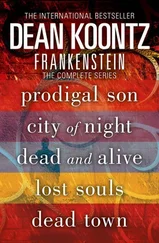“A boil is an inflamed, pus-filled hair follicle or pore."
On a street a half mile from the airport in Eugene, he sat in the parked Dodge long enough to gingerly unwind the bandages and use a tissue to wipe off the pungent but useless salve he'd purchased at a pharmacy. Although he pressed the Kleenex to his face so gently that the pressure might not have broken the surface tension on a pool of water, the agony of the touch was so great that he nearly passed out. The rearview mirror revealed clusters of hideous, large, red knobs with glistening yellow heads, and at the sight of himself, he actually did pass out for a minute or two, just long enough to dream that he was a grotesque but misunderstood creature being pursued through a stormy night by crowds of angry villagers with torches and pitchforks, but then the throbbing agony revived him.
“Carbuncles are interconnected clusters of boils."
Wishing he had left the gauze wrappings on his face, but afraid that the airwaves might already be carrying news of the bandaged man who had killed a minister in Spruce Hills, Junior abandoned the Dodge and hurriedly walked back to the private-service terminal, where the pilot from Sacramento waited. At the sight of his passenger, the pilot blanched and said, Allergic reaction to WHAT? And Junior said, Camellias, because Sacramento was the Camellia Capital of the World, and all that he wanted was to get back there, where he'd left his new Ford van and his Sklents and his Zedd collection and everything he needed to live in the future. The pilot couldn't conceal his intense revulsion, and Junior knew that he would have been stranded if he hadn't paid the round-trip charter fare in advance.
“Ordinarily, I'd recommend that you apply hot compresses every two hours to relieve discomfort and to hasten drainage, and I'd send you home with a prescription for an antibiotic."
Now, here, lying on a bed in the emergency room of a Sacramento hospital, on a Saturday afternoon only six weeks before the camellia festival, Junior suffered under the care of a resident physician who was so young as to raise the suspicion that he was merely playing doctor.
“But I've never seen a case like this. Usually, boils appear on the back of the neck. And in moist areas like the armpits and the groin. Not so often on the face. And never in a quantity like this. Really, I've never seen anything like it."
Of course, you've never seen anything like it, you worthless adolescent twit. You're not old enough to have seen squat, and even if you were older than your own grandfather, you wouldn't have seen anything like this, Dr Kildare, because this here is a true case of voodoo Baptist boils, and they don't come along often!
“I'm not sure which is more unusual-the site of the eruption, the number of boils, or the size of them."
While you're trying to decide, hand me a knife, and I'll cut your jugular you brainless medical-school dropout.
“I'm going to recommend that you be admitted overnight and that we lance these under hospital conditions. We'll use a sterile needle on some of them, but a number are so large they're going to require a surgical knife and possibly the removal of the carbuncle core. This is usually done with a local anesthetic, but in this instance, while I don't think general anesthesia will be required, we'll probably want to sedate you that is, put you in a twilight sleep."
I'll put you in a twilight sleep, you babbling cretin. Where'd you earn your medical degree, you nattering nitwit? Botswana? The Kingdom of Tonga?
“Did they rush you straight in here or did you arrange all the insurance matters at reception, Mr. Pinchbeck?"
“Cash,” Junior said. “I'll pay cash, with whatever amount of deposit is required."
“Then I'll attend to everything right away,” the doctor said, reaching for the privacy curtain that surrounded the ER bed.
“For the love of God,” Junior pleaded, “can't you please give me something for the pain?"
The boy-wonder physician turned to Junior again and assumed an expression of compassion so inauthentic that if he'd been playing a doctor on even the cheesiest daytime soap opera, he'd have been stripped of his actor's-union card, fired, and possibly horsewhipped on a live television special. “We'll be doing the procedure this afternoon, so I wouldn't want to give you anything much for the pain just prior to anesthesia and sedation. But don't you worry, Mr. Pinchbeck. Once we've lanced these boils, when you wake up, ninety percent of the pain will be gone."
In abject misery, Junior lay waiting to go under the knife, more eager to be cut than he would have thought possible only a few hours before. The mere promise of this surgery thrilled him more than all the sex that he'd ever enjoyed between the age of thirteen and the Thursday just past.
The pubescent physician returned with three colleagues, who crowded behind the privacy curtain to proclaim that none of them had ever seen any case remotely like this before. The oldest-a myopic, balding lump-insisted on asking Junior probing questions about his marital status, his family relationships, his dreams, and his self-esteem; the guy proved to be a clinical psychiatrist who speculated openly about the possibility of a psychosomatic component.
The moron.
At last: the humiliating backless gown, the precious drugs, even a pretty nurse who seemed to like him, and then oblivion.
MONDAY EVENING, January 15, Paul Damascus arrived at the hotel in San Francisco with Grace White. He had kept watch over her in Spruce Hills for more than two days, sleeping on the floor in the hall outside her room both nights, remaining close by her side when she was in public. They stayed with friends of hers until Harrison's funeral this morning, then flew south for a reunion of mother and daughter.
Tom Vanadium liked this man at once. Cop instinct told him that Damascus was honest and reliable. Priestly insight suggested even more impressive qualities.
“We were about to order dinner from room service,” Tom said, handing a menu to Paul.
Grace declined food, but Tom ordered for her, anyway, selecting those things that by now he knew Celestina liked, guessing that the mother's taste had shaped the daughter's.
The two bereaved women huddled at one end of the living room, tearful, touching, talking quietly, wondering together if there was any way that each could help the other to fill this sudden, deep, and terrible hole in their lives.
Celestina had wanted to go to Oregon for the service, but Tom, Max Bellini, the Spruce Hills police, and Wally Lipscomb-to whom, by Sunday, she'd begun talking almost hourly on the telephone-all advised strenuously against making the trip. A man as crazed and as reckless as Enoch Cain, expecting to find her at the funeral home or the cemetery, might not be deterred by a police guard, no matter what its size.
Angel didn't join the grieving women, but sat on the floor in front of the television, switching back and forth between Gunsmoke and The Monkees. Too young to be genuinely involved in either show, nevertheless she occasionally made gunfire sounds when Marshal Dillon went into battle or invented her own lyrics to sing along with the Monkees.
Once, she left the TV and came to Tom, where he sat talking with Paul. “It's like Gunsmoke and The Monkees are next to each other on the TV, both at the same time. But the Monkees, they can't see the cowboys-and the cowboys, they can't see the Monkees."
Although to Paul this was no more than childish chatter, Tom knew at once that the girl referred to his explanation for why he wasn't sad about his damaged face: the salt and pepper shakers representing two Toms, the hit-and-run rhinoceros, the different worlds all in one place. “Yes, Angel. That's something like what I was talking about."
Читать дальше











